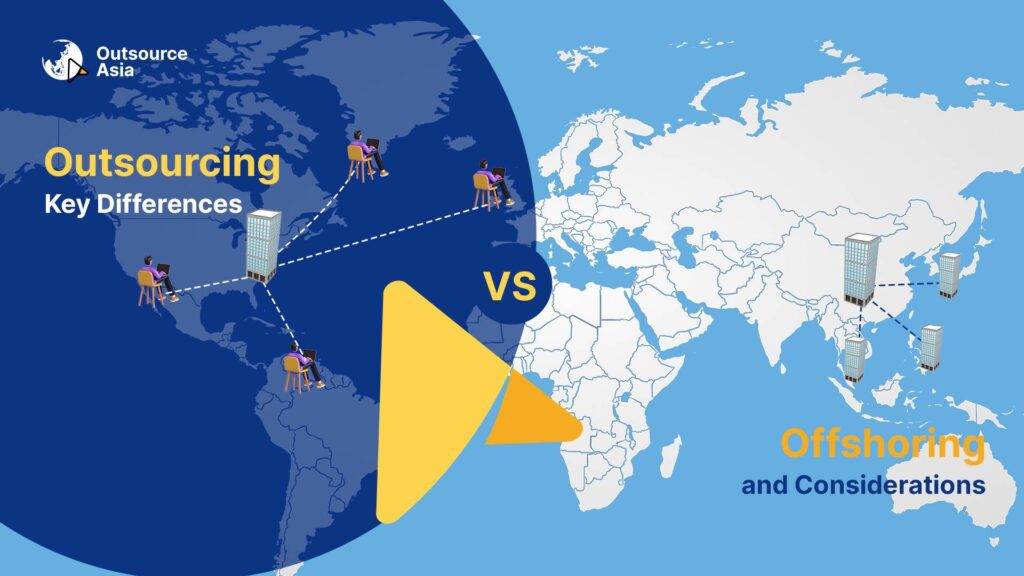As the digital revolution spreads globally, the business landscape continues to evolve at lightning speed. This shift is driven by globalization, technological advancements, and the post-pandemic era, which has made digital operations more accessible than ever. Companies no longer operate within rigid geographical boundaries, expanding into new markets with ease. This is made possible through improved communication technologies, faster transportation, and a ubiquitous internet presence, granting businesses access to a global pool of resources and talent.
In this evolving global marketplace, two prominent strategies, outsourcing and offshoring, offer unique benefits for businesses looking to optimize costs, boost efficiency, and access specialized skills. However, differentiating between these two approaches is critical for success. Misunderstanding these practices can lead to costly mistakes and operational hurdles. In this guide, we’ll explore the core differences between outsourcing and offshoring, their benefits and drawbacks, and how businesses can strategically leverage each to meet their goals.
Understanding Outsourcing
Outsourcing refers to the practice of contracting specific business functions or processes to external service providers. These providers can be either domestic or international and often specialize in the tasks companies wish to delegate. The primary aim of outsourcing is to streamline operations, reduce costs, and improve efficiency by harnessing the expertise of third-party vendors.
There are three common types of outsourcing:
- Offshore Outsourcing: Hiring a vendor located in a distant country, such as a U.S. company contracting a vendor in the Philippines.
- Nearshore Outsourcing: Partnering with a service provider in a neighboring country, like a German company outsourcing to a vendor in Poland.
- Onshore Outsourcing: Contracting a provider within the same country, such as a firm in New York hiring a vendor in California.
Benefits of Outsourcing
Outsourcing brings multiple advantages to businesses, making it an attractive strategy in today’s fast-paced market:
- Focus on Core Competencies: By outsourcing non-core or time-consuming tasks, companies can concentrate on their main business activities, increasing productivity.
- Access to Expertise: Businesses gain access to a larger talent pool and specialized skills they may not have in-house, enabling them to enhance service quality.
- Cost Savings: By avoiding the expenses associated with hiring, training, and maintaining infrastructure, outsourcing can lead to significant cost reductions.
Common Types of Outsourcing Services
Various functions are commonly outsourced depending on the company’s needs:
- Information Technology (IT): External IT providers handle network management, software updates, and technical support.
- Business Process Outsourcing (BPO): Services like customer support, payroll, and supply chain management are often outsourced.
- Human Resources (HR): Tasks such as recruitment, training, and payroll are frequently outsourced to HR service providers.
- Manufacturing: Production is often outsourced to countries with lower labor costs.
Pros and Cons of Outsourcing
Advantages
- Cost Savings: Outsourcing non-core tasks can yield cost savings, allowing businesses to allocate resources more efficiently.
- Scalability: Outsourcing provides flexibility to scale operations up or down based on business needs.
Challenges
- Communication and Coordination: Managing outsourced teams can be challenging, particularly across time zones.
- Data Security and Confidentiality: Sharing sensitive data with external parties raises security concerns.
- Quality Control: Ensuring consistent quality requires effective oversight and quality control measures.
Exploring Offshoring
Offshoring is a business strategy in which a company relocates operations or processes to another country. Unlike outsourcing, offshoring generally involves establishing a physical presence in a foreign location or transferring parts of the business abroad.
Differentiating Offshoring from Outsourcing
While often used interchangeably, offshoring and outsourcing differ substantially. Offshore outsourcing involves hiring a foreign-based vendor to manage tasks, while offshoring focuses on relocating operations abroad. Offshoring usually requires a larger commitment, involving either setting up a new facility or hiring employees in a foreign market. Outsourcing, on the other hand, involves delegating specific tasks to a third-party provider, regardless of location. Offshoring allows a company to retain control over the work processes, while outsourcing relies on an external provider.
Reasons for Offshoring
Businesses turn to offshoring for various reasons, including:
- Cost Savings: Labor costs in certain countries can be much lower than domestic costs.
- Access to Talent: Specialized skills, particularly in fields like software development and manufacturing, can be sourced more affordably abroad.
- Market Expansion: Establishing an international presence can increase market reach and customer access.
Advantages and Disadvantages of Offshoring
Pros
- Cost Efficiency: By offshoring labor-intensive tasks, businesses can drastically cut costs.
- Access to Specialized Skills: Offshoring provides access to a larger talent pool with unique expertise.
- Market Presence: A physical presence in new markets helps businesses understand local preferences.
Cons
- Cultural and Communication Barriers: Language and cultural differences can pose challenges.
- Geopolitical Risks: Political instability or policy changes can impact operations.
- Data Security and IP Concerns: Intellectual property protection can be harder to enforce in foreign jurisdictions.
Key Differences Between Outsourcing and Offshoring
Core Definitions and Nuances
Outsourcing contracts specific tasks to external providers, aiming for flexibility and cost savings. Offshoring, however, involves relocating entire processes abroad to leverage factors like lower labor costs and access to skilled talent. While outsourcing is generally a short-term solution, offshoring represents a long-term strategic commitment.
Geographical and Operational Distinctions
A key distinction is location: outsourcing providers may operate domestically, whereas offshoring requires an overseas setup. Outsourcing often involves discrete tasks handled by third-party vendors, while offshoring usually includes establishing comprehensive operations abroad.
Control Over Processes
Offshoring often allows companies to retain more control over processes and staff since it operates as an extension of the company abroad. Outsourcing, however, generally reduces the level of direct control since third-party providers handle the work independently.
Cost Savings vs. Strategic Growth
Outsourcing focuses on improving efficiency and cutting costs by delegating non-core tasks, while offshoring is often a strategic move to gain market presence, access specialized skills, and reduce operational expenses in a foreign location.
Impact on Domestic Job Markets
Outsourcing may have limited effects on domestic job markets, as it mostly reallocates specific tasks. Offshoring, however, can impact domestic employment in labor-intensive sectors, as these jobs may be moved abroad.
Choosing the Right Approach for Your Business
Aligning with Business Needs
Businesses should evaluate their unique objectives, resources, and competencies before deciding between outsourcing and offshoring. Companies must determine which functions can be handled by external providers and which require in-house expertise. Understanding the long-term goals of the company will also help align these decisions with overall growth strategies.
When to Consider Outsourcing
If the goal is to cut costs, access specialized skills, or manage temporary demands, outsourcing is often the ideal choice. Non-core tasks like customer support, IT services, and accounting are common examples. Outsourcing provides flexibility, allowing businesses to scale based on needs without large investments in infrastructure.
When to Consider Offshoring
Offshoring is best suited for businesses aiming to gain a foothold in foreign markets, access affordable labor, or tap into specialized skills not available domestically. Industries like manufacturing and IT often benefit from offshoring. However, offshoring requires a long-term commitment, careful planning, and consideration of legal and cultural differences.
Final Thoughts
Outsourcing and offshoring offer different advantages for businesses aiming to optimize operations and cut costs. Outsourcing focuses on delegating specific tasks to specialized vendors, while offshoring relocates entire operations abroad. Understanding these strategies and how they align with business objectives is essential for navigating the complexities of today’s global business environment.
Choosing between outsourcing and offshoring ultimately depends on a company’s goals, resources, and long-term vision. By carefully assessing these options, businesses can make informed choices that set them up for sustainable success in a competitive global market.
If you need help in finding the right outsourcing partner, book a FREE APPOINTMENT with Outsource Asia experts today.


